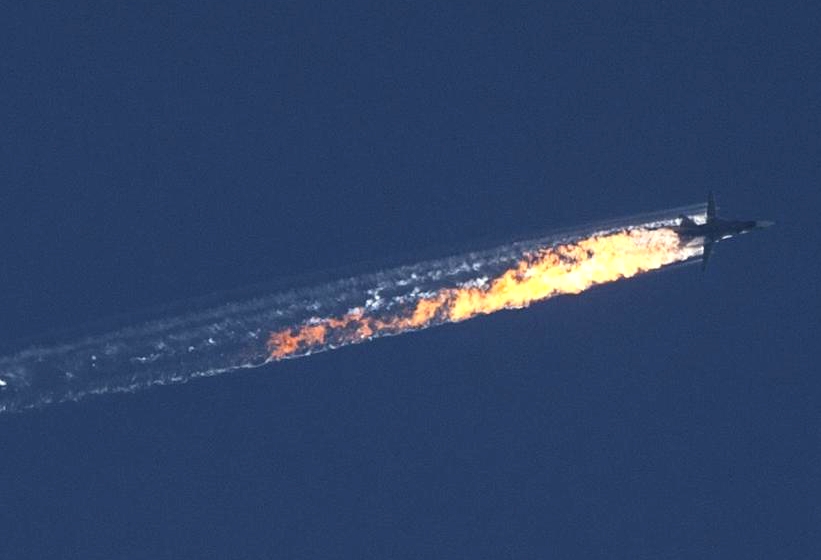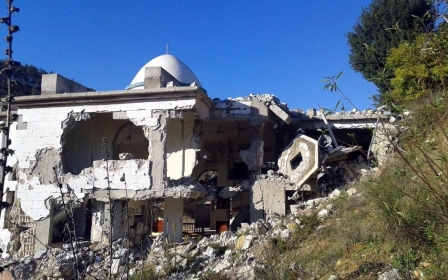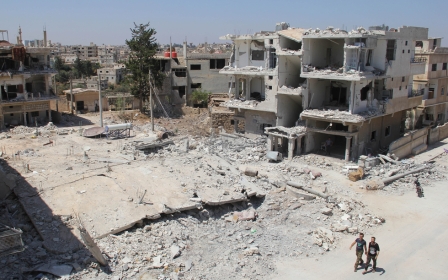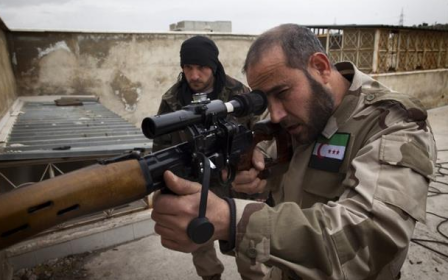Turkey downs Russian plane for 'violating airspace'

Vladimir Putin has called the shooting down of a Russian plane by Turkey a "stab in the back by the terrorists' accomplices" which would have serious consequences for relations between the two countries.
The Russian president's comments came hours after two Turkish F-16s fired on a Russian Su-24 on Tuesday, leading to the death of at least one of the pilots, after what Turkey said was a "violation of Turkish air space".
Turkish military and government statements said the jet had been warned 10 times in the five minutes before it was fired on, "under the rules of engagement".
In televised comments, Putin said: "Our plane was shot down over the territory of Syria by a missile from a Turkish F-16. It fell in Syrian territory 4km from the border with Turkey. Our pilots and our plane did not in any way threaten Turkey."
Putin claimed Turkey was supporting Islamic State (IS) by buying its oil. “IS has big money, hundreds of millions or even billions of dollars, from selling oil. In addition they are protected by the military of an entire nation," he said. "One can understand why they are acting so boldly and blatantly. Why they commit terrorist acts across the world, including in the heart of Europe."
Turkish state television, TRT, released an image purporting to be a military radar representation of the Russian jet's flightpath (dotted red line) passing over the Turkish border (thick blue line).
The two crew ejected from the stricken plane, the Russian defence ministry said, and one of the pilots was confirmed dead.
Military spokesman General Sergei Rudskoi said a Russian soldier had also been killed in a failed bid to rescue the pilots, whose Su-24 plane crashed in Syrian territory.
Rudskoi said Russia would cease all military contact with Turkey, as international concerns grow that the incident could snowball into a major conflict.
The general said the Su-24 "fell in Syrian territory, four kilometres (2.5 miles) from the border".
"The crew ejected," the general said. "According to preliminary information, one of the pilots died after being fired upon from the ground."
The fate of the second pilot was not immediately known.
In a statement published on the defence ministry's website, Rudskoi said a Russian soldier had been killed when his Mi-8 helicopter was "damaged by gunfire and had to land" during a search-and-rescue operation to retrieve the pair.
Two helicopters were used in the operation.
The rest of the crew onboard the stricken Mi-8 were evacuated to the Hmeimim air base in Syria's northern Latakia province, Rudskoi said, adding that the helicopter was hit by mortar fire coming from territory under rebel control.
Turkish news service Hurriyet reported that both of the pilots were killed by Turkmen fighters aligned with anti-government forces in Syria.
Jahed Ahmad, of the Free Syrian Army's 10th Brigade in the Coast, told the AP news agency that his men shot and killed at least one as they parachuted to the ground, an act that is outlawed in Article 42 of the Geneva Conventions, which states: "No person parachuting from an aircraft in distress shall be made the object of attack during his descent."
The group also published a graphic video showing gunmen standing around a dead pilot, whose face and body was bruised and bloodied.
Other video footage showed the Su-24 on fire and crashing into a mountain on the Syrian side of the border. The Turkish army said the jet was shot down at 7.24am GMT as it flew over the Yayladagi district of Hatay province.
A Russian helicopter apparently searching for the pilots was destroyed by rebels after it crash landed in government-held territory. Its crew escaped unharmed, according to reports.
Ankara said it would take the issue to the UN and NATO. The organisation's North Atlantic Council, which consists of ambassadors from 28 member states, held an extraordinary meeting at the request of Turkey on Tuesday afternoon.
Following the meeting, NATO Secretary General Jens Stoltenberg told reporters that multiple allies had provided information that was consistent with Turkey's claim that Russia crossed into its territory and said that the military alliance stood "in solidarity with Turkey".
"I call for calm and de-escalation," he added. "Diplomacy and de-escalation are important to solve this situation."
The Assad government meanwhile called the Russian plane’s destruction "a flagrant aggression against Syrian sovereignty".
Meanwhile, Turkish President Recep Tayyip Erdogan and US President Barack Obama agreed on the need to reduce tensions and prevent a repeat of similar incidents, the presidency said.
"They were in accord on the importance of de-escalating tensions and making arrangements to prevent a repeat of such incidents," the Turkish presidency said in a statement following telephone talks between the two leaders.
The statement said that Obama had emphasised in the telephone talks that Turkey's right to defend its sovereignty was "supported by the United States and NATO".
They also expressed their commitment to a bringing about a transitional political process for peace in Syria and joint determination to continue the fight against IS, the statement added.
Turkey and Russia have long been at loggerheads over the Syrian conflict. Ankara is seeking the overthrow of President Bashar al-Assad while Moscow is fighting to keep him in power.
Russian fighter jets entered Turkish air space in two separate incidents in October, prompting Ankara to summon the Russian ambassador in protest.
Turkey in October said it shot down a Russian-made drone that had entered its air space. Moscow denied it belonged to its forces.
Russian Foreign Minister Sergei Lavrov is due to visit Turkey on Wednesday in a bid to smooth ties and find a joint approach to finding peace in Syria.
The presence of military aircraft from Russia, the US, France, Turkey and a number of Gulf states in Syrian skies has long raised fears of an incident that could quickly escalate into a major diplomatic and military crisis.
Natasha Ezrow, a senior lecturer in international relations at the University of Essex, said that the confrontation could have serious consequences for Turkey - 60 percent of the country's gas is imported from Russia.
"I thought that Turkey would have been more cautious about this and use a little bit more rhetoric," she said, adding that she would not be surprised if Russia cut gas supplies in retaliation.
“[Turkey] just wants to make it clear that it's a sovereign nation," Ezrow said. "But I think they are going to face some repercussions. Russia has a lot of ways in which it can retaliate."
Middle East Eye propose une couverture et une analyse indépendantes et incomparables du Moyen-Orient, de l’Afrique du Nord et d’autres régions du monde. Pour en savoir plus sur la reprise de ce contenu et les frais qui s’appliquent, veuillez remplir ce formulaire [en anglais]. Pour en savoir plus sur MEE, cliquez ici [en anglais].




